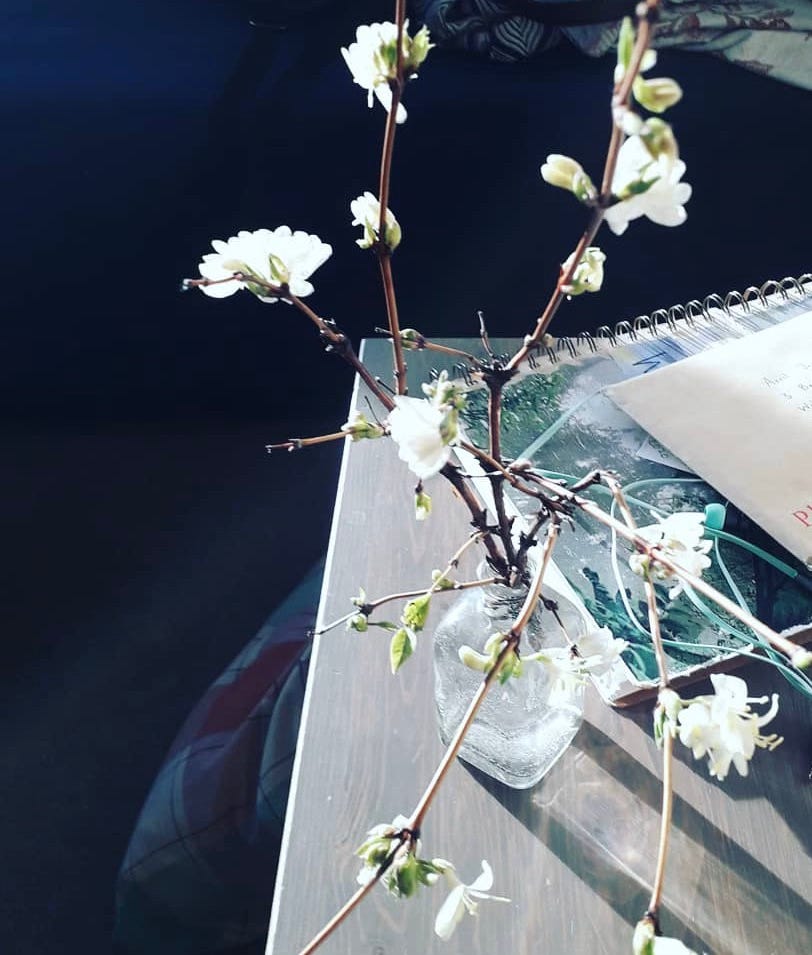Journal Keeping for Writers
“Love words, agonize over sentences. And pay attention to the world.” Susan Sontag
Keeping a diary has never been my thing. But keeping a writing journal has. I’ve been keeping my writing journal now since December 2018. Entries are often two or three months apart and mostly I use it as way of recording and reflecting on what’s been happening in my writing world and what my plans for the future might be.
In the recent hiatus prompted by the operation on my eye, I tried at least to write something everyday. I used my five things exercise, as well as simply writing something about my day. So it became a mixture of reflection and craft and it occurred to me that keeping such a journal could be valuable for all kinds of writers both beginner and experienced. For writers just getting off the ground it makes a good place to begin; helpful in establishing a daily ( or at-least-most-days) practice. For a writer between writing projects it offers continuity and a space in which to think and experiment. These in between times can be especially difficult and frustrating and are often the times when we’re tempted to give up, when we feel we have nothing to say and are lacking inspiration.
Journalling can be a very personal exercise. It is often used as a valuable therapeutic tool that involves soul searching, a place to still the mind, a place to resolve difficulties, to capture hopes and fears, and a place of gratitude. A Writer’s Journal is something else. Keeping a Writer’s Journal is a response to Susan Sontag’s exhortation, seen here in the subtitle - to love words, agonise over sentences. And pay attention to the world.
We all have a day, however it’s spent, we all have a world to write about and writing about what we know is a good place to begin. In our Writer’s Journal, we do not have to worry about inventing a world, creating characters for our stories or developing our plot lines but we can still write with the intention of practising our craft by employing fictional techniques, as well as getting ideas and inspiration down on the page. And it is just one small page, one fragment is all it need be.
Here are some suggestions for journal keeping as a writer. It’s a pick and mix of ideas you can employ to extend and vary what you do. A list you can add to. The possibilities are endless and exciting and I’ve no doubt that keeping a journal in this way over time will unearth ideas for future projects, whether prose or poetry, fiction or non-fiction:
Firstly - find yourself a notebook that you like and that you want to write in and is not too beautiful to be intimidating. The writing does not have to be neat.
Write one page a day, concentrating less on feeling and more on observation - it really is the old adage show don’t tell. So forgive me for repeating it, but show me the bedraggled ponies in the field sheltering from the storm, rather than tell me that you saw them and felt sad for them.
Limit the use of adjectives for five days.
Have days when you only use lists rather than sentences.
Try varying the length of your sentences. Determine on one day to write only in short punchy sentences. On another day give your account in one sentence only.
Think about your point of view. Don’t just write in the first person, try switching to you or she - experiment with first, second and third person
Try keeping your diary in another voice - a teenager, a Dutch painter, a New Yorker , a Victorian gardener, a charity shop worker, a busker…
Use images to inspire you to inhabit different characters and to find their voices. Write in the voice of the place you inhabit.
Think in images as well as words, doodle draw maps, stick in pictures.
Use found words - quotes, lines of poetry - cut up words and rearrange them.
Include a line or two of overheard dialogue or maybe something from what you’re reading or watching.
Record ideas - they are easily lost if not written down - ask questions - the what ifs.
Finally, enjoy, play, have fun!
It’s not easy to establish a journalling practice, if you’ve tried before and failed then it may help to set a goal of journalling for three weeks by which time you will be on your way to establishing a habit; a practice that you look forward to, that is an integral part of your day - good luck…
As always, thanks for reading
Avril x


